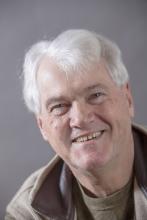Presented by Peter Whitehouse Peter J. Whitehouse MD-PhD has a primary appointment as Professor of Neurology, with secondary positions as Professor of Psychiatry, Cognitive Science, Neuroscience, and Organizational Behavior, and former appointments (but current interests) in Psychology, Bioethics, History, and Nursing at Case Western Reserve University. He is also currently Professor of Medicine at the University of Toronto, Honorary Research Fellow (zoology and aging) University of Oxford, and Founding President of Intergenerational Schools International. He is a card-carrying transdisciplinarian of the French variety. Major focuses of his current work have been age-associated cognitive challenges (formerly Alzheimer’s disease) and the nature of evidence and evidence of nature.
Abstract: “Alzheimer’s” is for many a dominant individual and social concern. How do we gather and analyze evidence wisely to understand the phenomenology of aging associated cognitive challenges and help people and communities suffering from the condition? Examined transdisciplinarily what is the nature of evidence? Almost hypothesis-less Big Data is said to be the answer to “curing” Alzheimer’s. But as always, framing the questions and examining the words in them are the best places to start finding helpful answers. How does Alzheimer’s-type dementia relate to aging? Is it one condition? Is preserving brain health more about molecules and genes or communities and politics? What is the evidence for evidence and whose version anyway? What is the story of Big Data in the biopolitics of dementia? How do we create not AI but new symbionic/symbiotic intelligences? What is the bigger story, even grander narrative, we need to tell about the brain and aging in the emergent Anthropocene? Deconstructing the narrative of Alzheimer’s can be part of understanding our collective great derangement in failing to address the collapse of ecosystems and hence also potentially modern civilization? More importantly, how to do we use data, narrative, and metaphor together to create not only knowledge but wisdom to reinvent ourselves and our societies to be more resilient and sustainable?


